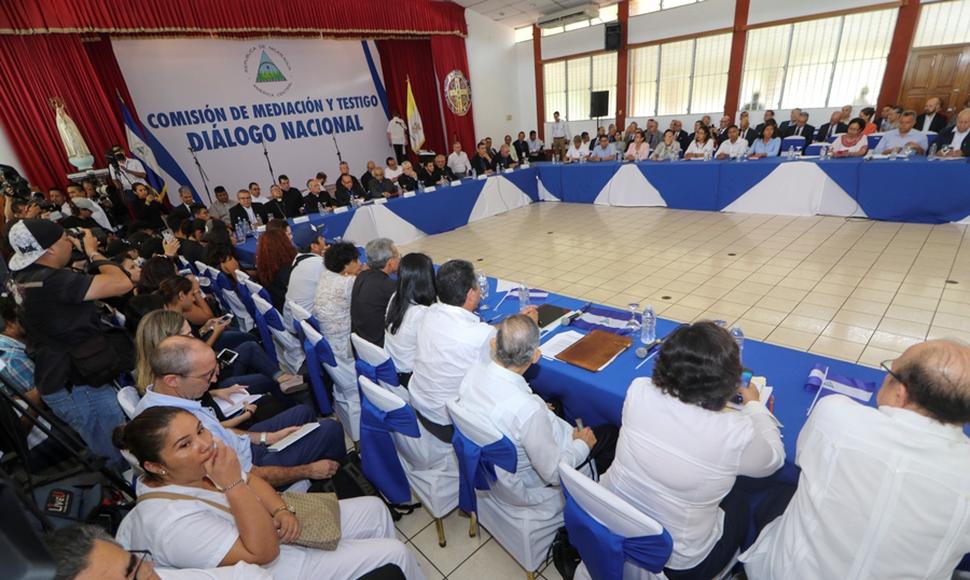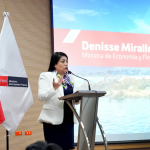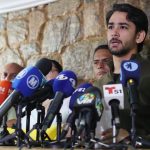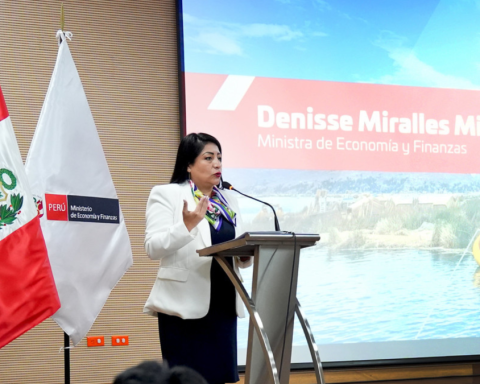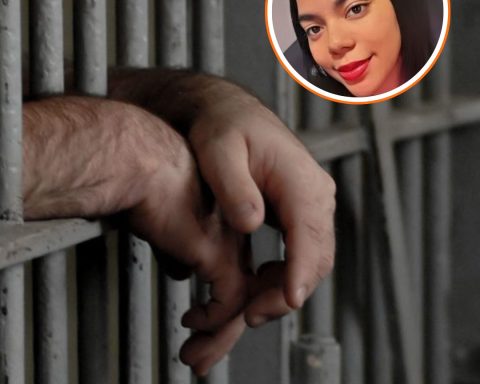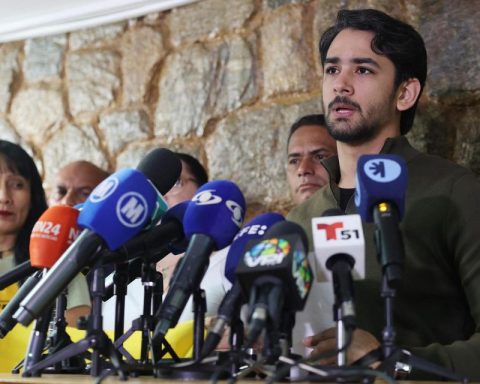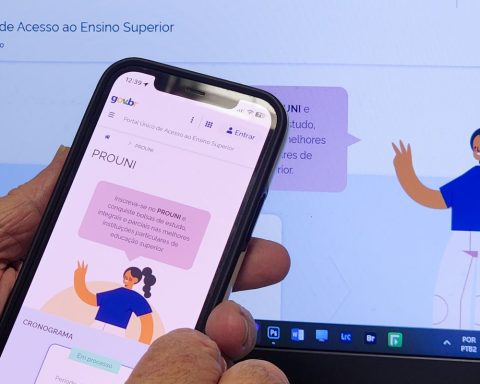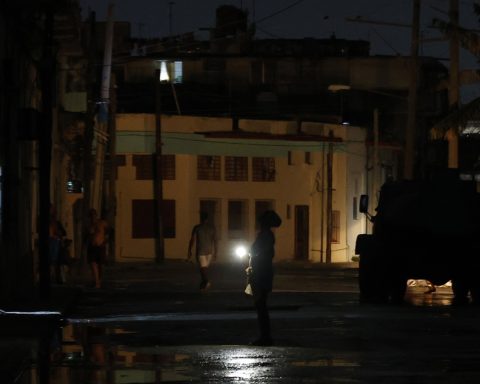It was approximately 10 in the morning on that Wednesday, May 16, when a large and heavily armed police and military device, moving at a run and visibly tense, announced the arrival of dictator Daniel Ortega at the facilities of the Archdiocesan Seminary of Managua, where The representation of the Civic Alliance for Justice and Democracy (ACJD) was already installed to start the first “National Dialogue”, in the context of citizen protests against the dictatorship.
Ortega’s entry was marked by historical symbolism. When he entered the room where the meeting would take place, dozens of students began to shout at him “murderer, murderer…”. It is the first time that they yelled “murderer” in Ortega’s face.
After 29 days of demonstrations and popular uprisings practically throughout the country, and at least 60 murdered, until that moment, the Episcopal Conference of Nicaragua (CEN) convened the first National Dialogue, where the ACJD, which at that time brought together all the Opposition groups, which had emerged in the heat of the protests, and the Government, sat face to face to discuss and seek a solution to the crisis.
This is how this dialogue was established, which for some opinion leaders was “failed” and for others it was timely; which left failures and achievements, although the two main demands were ignored by the dictatorship.
Related news: Monsignor Silvio Báez is against another attempt at dialogue without “respect for human rights”
Furthermore, other analysts point out that this dialogue itself was a smokescreen that Ortega launched to buy time, organize the paramilitary groups and launch them against the population.
The main demands that the Civic Alliance put on the table were, in principle, the cessation of repression, the entry into the country of international Human Rights organizations, justice for the victims of repression, and above all, the democratization of the country. which included advancement of general elections for 2019, renewal of the Supreme Electoral Council, reforms to the Political Constitution of Nicaragua that covered non-reelection and non-partisanship of justice.
Ortega, for his part, only asked for the lifting of the “tranques”, the trenches that the people made in each neighborhood to protect themselves from the paramilitaries.

In the midst of the dialoguers was the CEN, with all its bishops, as mediators and guarantors of the agreements that were reached there. When accepting to mediate this dialogue, the religious leaders warned that, if the meetings between the opposition and the Government did not bear positive results within 30 days from the first meeting, they would withdraw from the Dialogue.
The inauguration could not be more tense. Ortega, his wife and second in command of the dictatorship, Rosario Murillo, and his advisor for economic issues and Bayardo Arce, presided over the Government table, and in front of them, the Civic Alliance, where faces such as the recently deceased intellectual Carlos Tünnermann stood out. , the university student Lésther Alemán, the feminist Azahálea Solís, the economist Juan Sebastián Chamorro, among others.
The mediators and guarantors welcomed, raised their prayers for the successful conclusion of the meeting and gave the floor to Daniel Ortega and just when the dictator began to speak, the most impressive event of that dialogue occurred. The young university student Lésther Alemán interrupted him and ordered him to surrender, to hand over power and called him a murderer.
“This is not a dialogue table, it is a table to negotiate his exit,” the university student snapped at the dictator Ortega face to face.
Achievements and failures
The ACJD pressed during the Dialogue sessions for the Ortega-Murillo dictatorship to accept all or at least most of the points demanded, but Ortega did not give in.
That dialogue lasted a month and when there were hours left until the deadline given by the CEN to reach agreements or they withdrew from the mediation, when smoke came out of the dialogue table, although more than white it was gray, because the agreements “Achieved did not even touch on the main demands: the democratization of the country and the advancement of elections.”
The Ortega government and the Civic Alliance agreed to the “immediate” entry into the country of international human rights organizations, and the creation of a commission for an eventual lifting of the roadblocks that had paralyzed the country.
Related news: Young people seek dialogue between Nicaraguan opponents to confront Ortega
Initially, the Ortega regime did not accept any of the Civic Alliance’s proposals, which required an invitation to the United Nations High Commissioner for Human Rights (UN) and the European Union (EU).
The government gave in regarding the entry of the IACHR, the High Commissioner for Human Rights of the UN and the European Union, but it also managed to involve the General Secretariat of the Organization of American States (OAS), headed by Luis Almagro, to the process.
The agreement also established the creation of a “Verification and Security Commission”, whose functions would be to prepare a plan “for the implementation as soon as possible for the removal of the roadblocks.” And that’s where the first dialogue ended. The dictator did not give anything more.
Juan Sebastián Chamorro: “Ortega made fun of the international community”
In summary, the first national dialogue that was developed with Nicaragua paralyzed by protests cannot be described as successful, analysts have said, since little was achieved and what little was achieved, Ortega half fulfilled it or simply did not fulfill it.
The former political prisoner Juan Sebastián Chamorro, one of the protagonists in the first National Dialogue, came out in defense of what was achieved in those meetings with the dictatorship, and said that it cannot be described as a “failed dialogue” because it was precisely in those meetings that achieved entry into the country of the main international human rights organizations such as the Inter-American Commission on Human Rights (IACHR) and the United Nations High Commissioner for Human Rights OHCHR was invited.
Chamorro highlighted that the most visible importance of the arrival of human rights organizations to the country is that thanks to their work carried out in Nicaragua, since they were able to see first-hand the repression, they managed to document evidence for accusations of crimes of against humanity against the dictatorship.
Related news: Luis Jiménez, the regime’s envoy who arrived armed at the National Dialogue, at the head of the Chamber of Transporters
“The documentation of all these crimes would not have been possible without the agreement of the National Dialogue,” emphasizes Chamorro.
Chamorro recalled that the agreements reached in that first dialogue were reached “under a lot of pressure.” We threatened to withdraw from the table if this was not done, in the end they (the Government) did not return to the table, it was the regime that, in that first national dialogue, left the working table, as a consequence of the arrival of the organizations, which now, years later, are serving as compelling, verifiable evidence, documented by third parties, for cases of crimes against humanity,” said the political leader.
Dialogue unmasked Ortega
For Chamorro, from the point of view of the democratization of the country, which was one of the main demands of the opposition, “the results were not what we expected and this was not the fault of the opposition, of the Civic Alliance for Justice and “Democracy, but this happened because from the beginning the dictatorship had no intention of giving up anything in relation to political freedoms, early elections or electoral reforms.”
He recalled that they did not want to address that issue in the second dialogue either. «So, as a lesson here we are seeing a dictatorship that basically mocked the international community and the Nicaraguan people, because we were negotiating in good faith, in search of a good result, which obviously was not achieved.
“I believe that when they stood up, they took off the mask of what they really are: a tyranny that does not want to let go of power at any cost, and the national dialogue table also served that purpose, to unmask them,” the leader emphasized. .of the Civic Alliance.
Finally, Chamorro urged Ortega’s collaborators, who still accompany him “to abandon that ship, which is doomed to sink and those who leave with it will go to the depths of ignominy, injustice, shame.” historical. “There is still time to change course and be on the right side of history,” he concluded.
